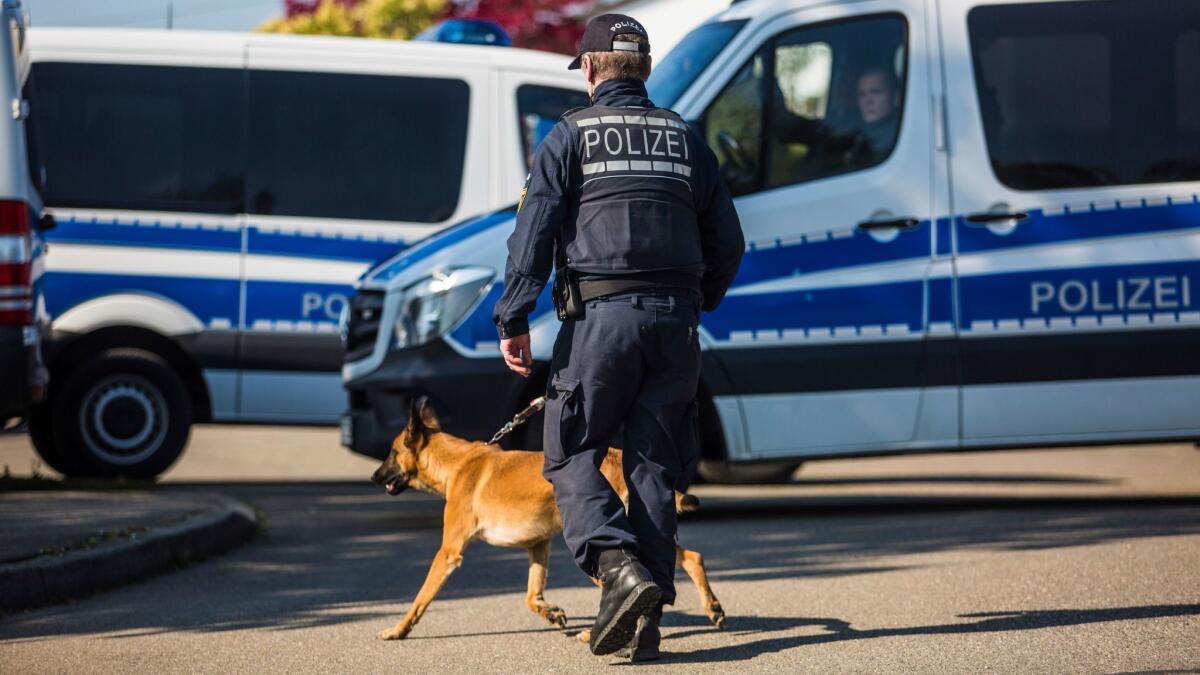Bomb attack on German soccer team was thought to be terror. Prosecutors now call it part of a get-rich-quick scheme

- Share via
Reporting from Berlin — A 28-year-old Russian immigrant in Germany was arrested on Friday and charged with attempted murder for a bungled attack last week against one of the country’s top soccer teams, in what authorities say was a nefarious attempt to drive the club’s share price down through a stock market gambling scheme.
Despite various claims of responsibility by Islamic State, as well as far-right extremists in Germany for the April 11 attack that seriously wounded one player and a police officer, police say that simple greed was behind the three explosions that hit the Borussia Dortmund team bus.
It was a bizarre twist to resolve what was an unsettling mystery behind the attack, which had kept the country on edge. Police have been quoted in German media saying some of the players could have been killed had the three small bombs exploded just seconds earlier or if the bus had passed closer to the bushes where the explosives had been planted.
“That someone evidently wanted to get rich by killing people in order to manipulate the stock market price is an especially repulsive form of greed,” German Interior Minister Thomas de Maiziere said after praising the police work that led to the arrest at dawn Friday by anti-terror forces. Prosecutors identified the bomber only as Sergei W., a dual national with Russian and German citizenship.
The bombing occurred as the team was heading to a Champions League game against AS Monaco in the western city of Dortmund. In addition to attempted murder, the suspect also was charged by federal prosecutors with inflicting serious bodily harm and staging an attack with explosives.
“The evidence is overwhelming,” de Maiziere said . “It is especially perfidious that this man played on public fears by acting like a terrorist.”

Nerves about terror have been running high in Germany, which has taken in more than 1 million refugees in the last two years and is gearing up for an election on Sept. 24, following a terror attack in Berlin on Dec. 19 that killed 12 people at a Christmas market. Islamic State claimed responsibility for that attack by a Tunisian refugee who had futilely sought asylum in Germany. Fears of further attacks in neighboring France ahead of that country’s elections starting on Sunday have contributed to a sense of discomfort across Germany.
The attack against the Borussia Dortmund team bus, which was filled with some of the country’s biggest sports stars, shortly after it left its hotel en route to the stadium only exacerbated that angst. Soccer is the most popular sport by far in Germany and across Europe, and games in the later stages of the Champions League tournament, a competition featuring the continent’s top clubs, regularly draw TV ratings to rival the Super Bowl.
The Champions League quarterfinal game against AS Monaco was postponed a day. Dortmund, whose players were clearly rattled by the attack, ended up getting knocked out of the tournament after being upset in the two-leg competition by Monaco, losing, 3-2, at home and then losing away, 3-1, for an aggregate score of 6-3.
Federal prosecutors said the suspect, who also was staying in the same hotel as the team, had bought 15,000 put options for a total of 78,000 euros ($80,000) on the Internet for shares in Borussia Dortmund, the only top club in Germany that is publicly listed.
The options, which the suspect bought with a consumer loan, would have given him the right to sell the shares at a later time for a previously agreed price.
Financial analysts were quoted in German media reports saying he could have earned more than $4 million if the club’s share price had plunged after the attack. It didn’t. It dipped only slightly, from around 5.70 euros before the attack to about 5.50 euros.
Police later tracked one of the stock transactions to a computer with the hotel’s IP address.
Hotel staff later told investigators that when other hotel guests rushed outside after the explosion on the street in front of the hotel, the suspect went into the hotel’s restaurant an ordered a steak dinner.
“We assume that the suspect arrested is responsible for the attack,” said Frauke Koehler, a spokeswoman for the prosecutors’ office. “The suspect bought three different derivatives on shares of Borussia Dortmund, betting on a falling share price. The majority was bought on April 11, the day of the attack.”
The seriously injured player was Borussia Dortmund defender Marc Bartra, 26. He had to undergo surgery to remove shrapnel in his right arm and wrist, and he is expected to be out of action for much of the rest of the season.
“It was only good fortune that nothing worse happened,” Koehler said.
MORE WORLD NEWS
‘Even the stones reek with sadness’: Here is what’s left of Aleppo
Tens of thousands of Venezuelans march against President Nicolas Maduro
UPDATES:
12:35 p.m.: This article has been updated throughout with Times staff reporting, including comments from Thomas de Maiziere and details on the arrest of the bombing suspect.
This article was originally published at 5:30 a.m.
More to Read
Sign up for Essential California
The most important California stories and recommendations in your inbox every morning.
You may occasionally receive promotional content from the Los Angeles Times.










